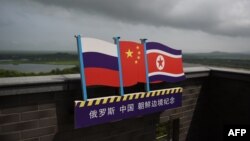미국과 중국, 러시아 간 지정학적 긴장이 계속 고조되는 상황이 북한 경제에 도움이 될 수도 있다는 분석이 나왔습니다. 다만 중국과 러시아의 대북 지원에는 그에 따른 조건이나 한계도 분명하다고 전문가들은 지적했습니다. 김영교 기자가 보도합니다.
북한경제 전문가인 루디거 프랭크 오스트리아 빈대학교 교수는 2일 미국과 중국,러시아 간 지정학적 긴장 고조가 북한에는 경제적으로 유리한 상황이 될 수 있다고 진단했습니다.
[녹취: 프랭크 교수] “This is when actually China and Russia and the new situation after the Russian invasion in Ukraine come up as pretty interesting options for a totally changed situation here. More or less, you could see light at the end of the tunnel, at least from Pyongyang's perspective.”
프랭크 교수는 이날 워싱턴의 민간단체인 전미북한위원회(NCNK)가 연 북한경제 관련 화상간담회에서 이같이 밝히며, 특히 러시아의 우크라이나 침공으로 인해 완전히 새로운 지정학적 분위기가 조성되면서 북한 정권의 입장에서는 ‘터널의 끝’이 보일 수도 있다고 말했습니다.
프랭크 교수는 지난달 중국과 러시아가 유엔 안보리에서 추진된 새로운 대북 결의안에 반대한 것을 거론하면서, 이는 중국과 러시아의 대북 정책에 변화가 생겼다는 것을 뜻한다고 말했습니다.
그러면서 중국과 러시아가 북한을 지원하는 것이 정치적으로 유용하다고 판단한다면 북한이 수출을 통해 창출한 수익으로 식량을 수입할 수 있는 능력이 있는지는 덜 중요한 사안이 될 것이라고 말했습니다.
[녹취: 프랭크 교수] “On May 26, both Russia which was expected and China which was not so clear, vetoed a UN Security Council resolution against North Korea, which means that they have changed their policy vis-à-vis that country. The ability of North Korea to pay for food imports, which would be by revenue generated through exports, will matter less if both Beijing and Moscow will see a political utility in supporting North Korea.”
앞서 지난달 26일 유엔 안보리는 미국 주도로 북한의 대륙간탄도미사일(ICBM) 발사에 대응한 추가 결의안 채택을 시도했지만 중국과 러시아가 거부권을 행사해 부결됐습니다. 안보리 대북 제재 결의안이 부결된 최초 사례입니다.
프랭크 교수는 우크라니아 사태를 계기로 러시아가 반서방 연대를 강화하는 움직임을 보이고 있다며, 1950년대에서 80년대에 걸쳐 했던 것처럼 북한을 여기에 포함시키려고 할 것이라고 말했습니다.
이에 따라 경제 악화와 식량 부족, 신종 코로나바이러스 감염증 확산과 그에 따른 봉쇄라는 어려움 속에서도 북한 정권은 버틸 수 있다는 자신감이 예전보다 더 커질 수 있다고 덧붙였습니다.
[녹취: 프랭크 교수] “Moscow has been stepping up what they called an anti-Western alternative or alliance. It can be expected they will try to include North Korea and so in a way we are back to the 1950s, 60s, 70s, 80s here, where they've done something similar with which North Korea was able to really benefit from this. Despite the worsening economy and looming food shortage due to COVID and the lockdown, the North Korean leadership will actually be more confident than it was before.”
영국 런던대 동양아프리카대학원(SOAS) 한국학연구센터의 헤이즐 스미스 교수는 이날 간담회에서 지난 몇 년간 북한과 중국, 러시아가 계속 밀착하는 모습을 보이고 있다면서, 부분적으로는 미국에 대항하기 위한 이유도 있었다고 말했습니다.
특히 북중 무역의 경우 북한이 전 세계와 거래하는 무역량의 거의 전부를 차지했다고 해도 과언이 아니라고 설명했습니다.
[녹취: 스미스 교수] "In terms of the relationship with China and Russia have become increasingly, increasingly close over the last few years, partly in opposition to the United States. North Korea-China trade, for the last few years, is basically a synonym for North Korea's trade with the entire world."
스미스 교수는 다만 북한에 대한 중국과 러시아의 지원에는 한계가 있을 것으로 내다보면서, 세 나라 관계는 사상적인 연대보다는 거래적인 성격이 더 강하다고 지적했습니다.
그러면서 러시아는 냉전 이후로 북한에 충분히 지원을 한 적이 없고, 현재 러시아 자체가 국제사회의 제재로 직면한 경제 위기 상황에서 북한을 도울 여유가 없을 것이라고 설명했습니다.
[녹취: 스미스 교수] It's more transactional relationship than a question of philosophical alignment. If we look historically, Russia hasn't really, apart from during the Cold War, given that much North Korea, and given its economic crisis because of sanctions, my view is that it's not going to follow up with very major aid. And China, whereas it has given a lot of aid in 2019, will also be considering carefully whether or not North Korea is worth them giving massive aid. And one of the reasons that China may not have given great imports in 2021 is because it's it may be concerned at home about the impact of COVID on its own agricultural sector. It’s got large grain reserves, which is why it's been able to support North Korea in the past, but it will be planning for the future as every country is.”
스미스 교수는 중국도 2019년에는 북한에 많은 지원을 했지만, 북한이 대규모 지원을 할 가치가 있는지 여부를 신중히 고려할 것이라고 예상했습니다.
또 중국이 2021년에는 북한에 대규모로 식량을 제공하지 않은 것은 중국 내 코로나바이러스 감염증 확산이 자국의 농업 부문에 미칠 영향을 우려한데 따른 것으로 보인다고 말했습니다.
그에 따라 중국이 향후 자국 내 농작물의 수급량을 고려한 상황에서 북한에 대한 지원 여부를 결정할 것이라고 스미스 교수는 내다봤습니다.
윌리엄 브라운 미국 메릴랜드대 동북아 경제 교수는 이날 VOA와의 전화통화에서 현재의 지정학적 상황으로 인해 북한과 중국. 러시아 간의 경제 교류가 늘어날 수 있을 것으로 내다봤습니다.
브라운 교수는 그러나 그런 거래에는 조건이 붙을 것이라고 지적했습니다.
블라디미르 푸틴 러시아 대통령이나 시진핑 중국 국가주석이 북한에 아무 보답을 바라지 않고 지원하지는 않을 것이라는 겁니다.
[녹취: 브라운 교수] “It's the question of at what cost? With any kind of aid, there are strings attached. Imagine Putin and Xi Jinping, the two of them they're not going to give anything away. They are going to give aid but there's strings attached to them. For Russia, it needs money more than anybody, and they’re in really bad shape. At the margin, there's a little bit of things that they give each other.”
브라운 교수는 특히 러시아는 국제사회의 제재로 현금이 부족한 상태라며, 북한과 러시아의 경우 필요한 것을 서로 주고 받는 형태가 될 수도 있다고 설명했습니다.
VOA뉴스 김영교입니다.




